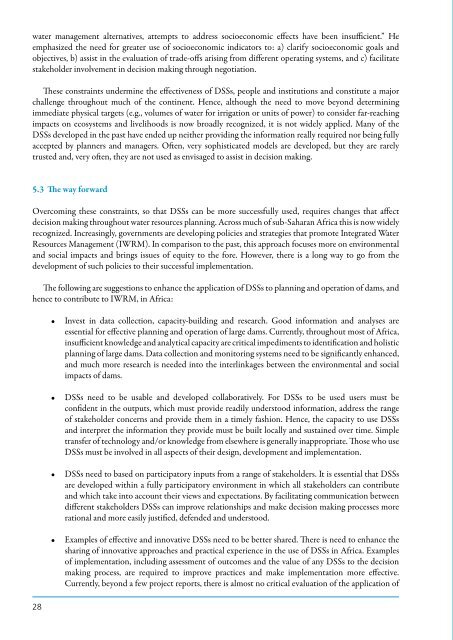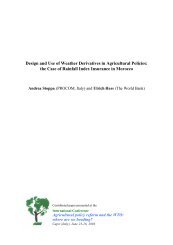Use of decision support systems to improve dam planning and dam ...
Use of decision support systems to improve dam planning and dam ...
Use of decision support systems to improve dam planning and dam ...
You also want an ePaper? Increase the reach of your titles
YUMPU automatically turns print PDFs into web optimized ePapers that Google loves.
water management alternatives, attempts <strong>to</strong> address socioeconomic effects have been insufficient.” He<br />
emphasized the need for greater use <strong>of</strong> socioeconomic indica<strong>to</strong>rs <strong>to</strong>: a) clarify socioeconomic goals <strong>and</strong><br />
objectives, b) assist in the evaluation <strong>of</strong> trade-<strong>of</strong>fs arising from different operating <strong>systems</strong>, <strong>and</strong> c) facilitate<br />
stakeholder involvement in <strong>decision</strong> making through negotiation.<br />
These constraints undermine the effectiveness <strong>of</strong> DSSs, people <strong>and</strong> institutions <strong>and</strong> constitute a major<br />
challenge throughout much <strong>of</strong> the continent. Hence, although the need <strong>to</strong> move beyond determining<br />
immediate physical targets (e.g., volumes <strong>of</strong> water for irrigation or units <strong>of</strong> power) <strong>to</strong> consider far-reaching<br />
impacts on eco<strong>systems</strong> <strong>and</strong> livelihoods is now broadly recognized, it is not widely applied. Many <strong>of</strong> the<br />
DSSs developed in the past have ended up neither providing the information really required nor being fully<br />
accepted by planners <strong>and</strong> managers. Often, very sophisticated models are developed, but they are rarely<br />
trusted <strong>and</strong>, very <strong>of</strong>ten, they are not used as envisaged <strong>to</strong> assist in <strong>decision</strong> making.<br />
5.3 The way forward<br />
Overcoming these constraints, so that DSSs can be more successfully used, requires changes that affect<br />
<strong>decision</strong> making throughout water resources <strong>planning</strong>. Across much <strong>of</strong> sub-Saharan Africa this is now widely<br />
recognized. Increasingly, governments are developing policies <strong>and</strong> strategies that promote Integrated Water<br />
Resources Management (IWRM). In comparison <strong>to</strong> the past, this approach focuses more on environmental<br />
<strong>and</strong> social impacts <strong>and</strong> brings issues <strong>of</strong> equity <strong>to</strong> the fore. However, there is a long way <strong>to</strong> go from the<br />
development <strong>of</strong> such policies <strong>to</strong> their successful implementation.<br />
The following are suggestions <strong>to</strong> enhance the application <strong>of</strong> DSSs <strong>to</strong> <strong>planning</strong> <strong>and</strong> operation <strong>of</strong> <strong>dam</strong>s, <strong>and</strong><br />
hence <strong>to</strong> contribute <strong>to</strong> IWRM, in Africa:<br />
28<br />
• Invest in data collection, capacity-building <strong>and</strong> research. Good information <strong>and</strong> analyses are<br />
essential for effective <strong>planning</strong> <strong>and</strong> operation <strong>of</strong> large <strong>dam</strong>s. Currently, throughout most <strong>of</strong> Africa,<br />
insufficient knowledge <strong>and</strong> analytical capacity are critical impediments <strong>to</strong> identification <strong>and</strong> holistic<br />
<strong>planning</strong> <strong>of</strong> large <strong>dam</strong>s. Data collection <strong>and</strong> moni<strong>to</strong>ring <strong>systems</strong> need <strong>to</strong> be significantly enhanced,<br />
<strong>and</strong> much more research is needed in<strong>to</strong> the interlinkages between the environmental <strong>and</strong> social<br />
impacts <strong>of</strong> <strong>dam</strong>s.<br />
• DSSs need <strong>to</strong> be usable <strong>and</strong> developed collaboratively. For DSSs <strong>to</strong> be used users must be<br />
confident in the outputs, which must provide readily unders<strong>to</strong>od information, address the range<br />
<strong>of</strong> stakeholder concerns <strong>and</strong> provide them in a timely fashion. Hence, the capacity <strong>to</strong> use DSSs<br />
<strong>and</strong> interpret the information they provide must be built locally <strong>and</strong> sustained over time. Simple<br />
transfer <strong>of</strong> technology <strong>and</strong>/or knowledge from elsewhere is generally inappropriate. Those who use<br />
DSSs must be involved in all aspects <strong>of</strong> their design, development <strong>and</strong> implementation.<br />
• DSSs need <strong>to</strong> based on participa<strong>to</strong>ry inputs from a range <strong>of</strong> stakeholders. It is essential that DSSs<br />
are developed within a fully participa<strong>to</strong>ry environment in which all stakeholders can contribute<br />
<strong>and</strong> which take in<strong>to</strong> account their views <strong>and</strong> expectations. By facilitating communication between<br />
different stakeholders DSSs can <strong>improve</strong> relationships <strong>and</strong> make <strong>decision</strong> making processes more<br />
rational <strong>and</strong> more easily justified, defended <strong>and</strong> unders<strong>to</strong>od.<br />
• Examples <strong>of</strong> effective <strong>and</strong> innovative DSSs need <strong>to</strong> be better shared. There is need <strong>to</strong> enhance the<br />
sharing <strong>of</strong> innovative approaches <strong>and</strong> practical experience in the use <strong>of</strong> DSSs in Africa. Examples<br />
<strong>of</strong> implementation, including assessment <strong>of</strong> outcomes <strong>and</strong> the value <strong>of</strong> any DSSs <strong>to</strong> the <strong>decision</strong><br />
making process, are required <strong>to</strong> <strong>improve</strong> practices <strong>and</strong> make implementation more effective.<br />
Currently, beyond a few project reports, there is almost no critical evaluation <strong>of</strong> the application <strong>of</strong>





